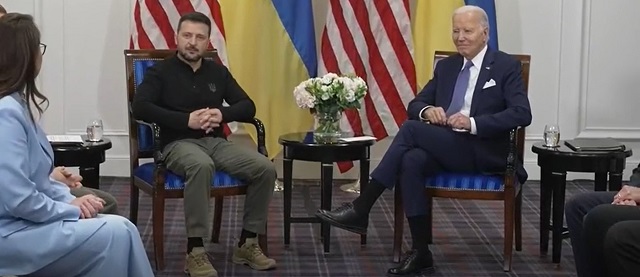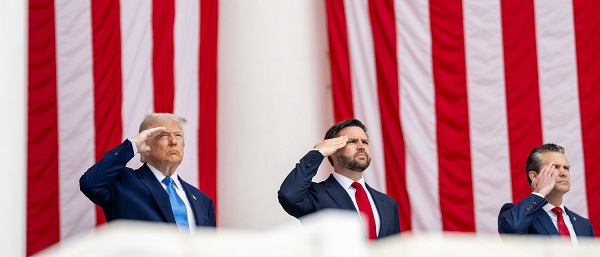conflict
Europeans Aren’t Concerned About Russian Bear Invading Continent After Ukraine

 From the Daily Caller News Foundation
From the Daily Caller News Foundation
The foreign policy blob in Washington, D.C., would have us believe that Vladimir Putin is Adolf Hitler 2.0 and must be stopped before he rolls over the rest of Europe. It is an intellectually lazy argument.
In the first place, Russia has struggled in its fight with Ukraine—a small nation with one-fourth Russia’s population and far fewer resources. How would Mother Russia fare against the combined firepower of NATO? Likely not so hot: Europe’s economy is six times larger than Russia’s. Likewise, the population advantage of Europe stands three-to-one over Russia.
Aside from Russia’s vast nuclear weapons stockpiles, it is no match for Europe.
Putin knows he would be crushed in a head-to-head with NATO and has repeatedly made clear that he has no interest in going to war with any NATO country, including Poland.
Secondly, if Europe was seriously under threat from the Russian bear, you might think that Europeans themselves would be more alarmed. They don’t seem to be. In fact, across nearly every threat measured by the Munich Security Council, trends show a downward ebb among Europeans. To most, Russia ranks as a threat below radical Islamic terrorism and mass migration. The Germans are more worried about cyber attacks than Putin; to the French, racism is more worrisome.
Aren’t these the very people America is spending $185 billion in Ukraine to protect from Russian expansionism?
Across the European continent, the United States maintains 100,000 troops on 185 major military bases and 78 minor sites (minor being defined as less than 10 acres or $10 million). Taken altogether, American forward operating bases in Europe sprawl over 265,000 acres with an estimated value of $95.5 billion. When one examines the Department of Defense’s annual budget, protecting Europe is America’s largest yearly expenditure—and that’s before Ukraine supplemental funding is added to the tally.
Yet the average resident of Berlin is likely more worried about his email getting hacked than he frets about the Kremlin rolling tanks through Deutschland.
Europe was the world’s center for combat power from roughly 1400 until 1945. No more. Even the larger armies of NATO are struggling to maintain effective combat power. The British Army cannot sustain a complete expeditionary armored brigade. At 23 years old, the Charles de Gaulle, France’s flagship and sole aircraft carrier, is reaching the end of its effective lifespan but sea trials are not expected to begin for its replacement until 2036.
The French have less than 90 heavy artillery pieces—Russia is losing more each month fighting Ukraine. Reporting in October 2022 found that Germany only had enough ammunition for two days of war, far below the NATO 30-day minimum. In 2022 NATO exercises, none of the Bundeswehr’s 18 new Puma infantry fighting vehicles were able to complete the drill.
Ukraine has revealed many of NATO’s weakness. These led a professor of war studies at the University of Warwick, Anthony King, to remark that Europe has “systematically demilitarized itself because it didn’t need to spend the money. They have basically gone to sleep.”
That ambivalence toward defense comes across in another recent survey of Europeans. Sixty percent of Italians, 47% of Germans and 40% of the French are in favor of cutting off arms shipments to Ukraine. Across Europe, 60% think that Ukraine will be an economic burden. Among the French, Spanish and Italians, more than 40% either don’t know or don’t care who wins the war in Ukraine.
Perhaps America’s security blanket for Europe has been too heavy and we have indeed lulled the continent into a stupor. Or maybe Europeans are correct in their assessment of Putin—that his invasion of Ukraine is not a precursor to the reassembly of the U.S.S.R.
In either case, more American taxpayers are questioning the D.C. logic that demands ever-increasing blank checks for a war with no end in sight.
Morgan Murphy is a former DoD press secretary, national security adviser in the U.S. Senate, a veteran of Afghanistan.
The views and opinions expressed in this commentary are those of the author and do not reflect the official position of the Daily Caller News Foundation.
Featured image credit: (Screen Capture/CSPAN)
Artificial Intelligence
AI Drone ‘Swarms’ Unleashed On Ukraine Battlefields, Marking New Era Of Warfare


From the Daily Caller News Foundation
Artificial intelligence-powered drones are making their first appearances on the battlefield in the Russia-Ukraine war as warfare creeps closer to full automation.
In bombardments on Russian targets in the past year, Ukrainian drones acting in concert were able to independently determine where to strike without human input.
It’s the first battlefield use of AI “swarm” technology in a real-world environment, a senior Ukrainian official and Swarmer, the company who makes the software, told the Wall Street Journal in a Tuesday report. While drones have increasingly defined modern battlefields, swarms until now had been confined to testing rather than combat.
“You set the target and the drones do the rest,” Swarmer Chief Executive Serhii Kupriienko told the WSJ. “They work together, they adapt.”
So far, the Swarmer technology has been used hundreds of times to target Russia assets, but was first used a year ago to lay mines on the front, the Ukrainian official told the WSJ. The software has been tested with up to 25 drones at once, but is usually utilized with only three.
Kupriienko told the WSJ that he was preparing to test up to 100 drones at once with the linking software.
A common arrangement used on the battlefield includes one reconnaissance drone to scout out the target and two explosive drones delivering the payload on target, the official told the WSJ.
While Western nations such as the U.S., France and the United Kingdom are also pursuing drone swarm technology, they have not deployed swarm technology on the battlefield the way Ukraine has, according to the WSJ. Currently, autonomous weapons are not regulated by any international authority or binding agreement, but ethical concerns around the technology has led many to call for increased regulation of weapons like the Swarmer system.
The Ukrainian Ministry of Foreign Affairs did not immediately respond to the Daily Caller News Foundation’s request for comment.
conflict
Trump Pentagon Reportedly Blocking Ukraine From Firing Western Missiles Deep Into Russia


From the Daily Caller News Foundation
The Department of Defense has spent months blocking the Ukrainian military from using American and British-made missiles to hit targets deep inside Russia, The Wall Street Journal reported Sunday, citing unnamed U.S. officials.
Undersecretary of Defense for Policy Eldridge Colby reportedly designed the procedure to review requests to carry out the long-range strikes with weapons that are either of U.S. origin or that require American intelligence or use components provided by the U.S., according to the WSJ. Secretary of Defense Pete Hegseth reportedly has the final say on whether Ukrainian forces can use the MGM-140 ATACMS (Army Tactical Missile System) to hit targets in Russia.
The reported blocks on missile strikes coincides with a Trump administration effort to broker a peace deal between Russia and Ukraine. A Pentagon spokesperson declined to comment further on the matter.
BREAKING: President Vladimir Putin reacts to B-2 Flyover pic.twitter.com/1mzVn7DxlW
— Jack Poso 🇺🇸 (@JackPosobiec) August 15, 2025
The Biden administration allowed Ukraine to carry out strikes with ATACMS in November, weeks after President Donald Trump won the 2024 election, the New York Times reported. Trump criticized the move during a December interview with Time magazine.
“It’s crazy what’s taking place. It’s crazy,” Trump said. “I disagree very vehemently with sending missiles hundreds of miles into Russia. Why are we doing that? We’re just escalating this war and making it worse. That should not have been allowed to be done.”
Trump and Russian President Vladimir Putin met in Alaska on Aug. 15 for a summit meeting during which Trump sought to secure a cease-fire in Russia’s war with Ukraine. As Trump greeted Putin, a B-2A Spirit stealth bomber and several fighters carried out a flyover of Elmendorf Air Force Base.
Trump met with Ukrainian President Volodymyr Zelensky and major European leaders on Aug. 18 to update them on the summit.
In July, Trump reached an agreement with NATO where members of the alliance would purchase weapons, including MIM-104 Patriot surface-to-air missiles, and donate them to Ukraine.
-

 Digital ID2 days ago
Digital ID2 days agoCanada releases new digital ID app for personal documents despite privacy concerns
-

 Energy2 days ago
Energy2 days agoCanada’s sudden rediscovery of energy ambition has been greeted with a familiar charge: hypocrisy
-

 Business8 hours ago
Business8 hours agoOttawa Pretends To Pivot But Keeps Spending Like Trudeau
-

 armed forces1 day ago
armed forces1 day agoOttawa’s Newly Released Defence Plan Crosses a Dangerous Line
-

 Energy8 hours ago
Energy8 hours agoLiberals Twisted Themselves Into Pretzels Over Their Own Pipeline MOU
-

 Censorship Industrial Complex5 hours ago
Censorship Industrial Complex5 hours agoHow Wikipedia Got Captured: Leftist Editors & Foreign Influence On Internet’s Biggest Source of Info
-

 Bruce Dowbiggin2 days ago
Bruce Dowbiggin2 days agoNFL Ice Bowls Turn Down The Thermostat on Climate Change Hysteria
-

 Energy2 days ago
Energy2 days agoCan we not be hysterical about AI and energy usage?









